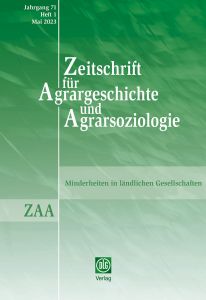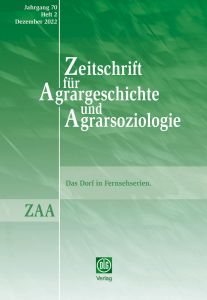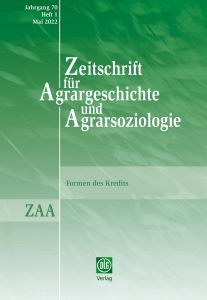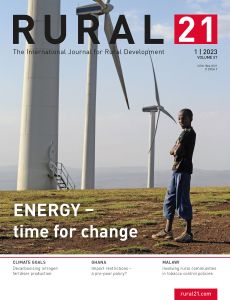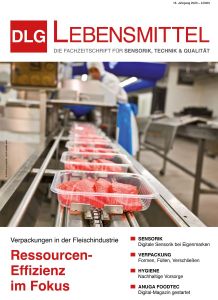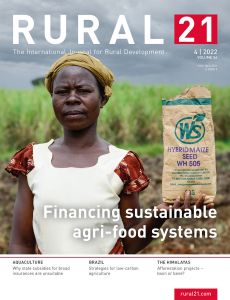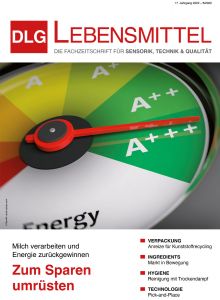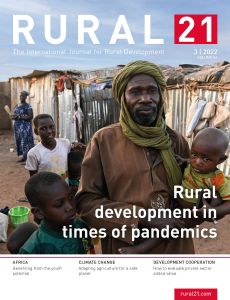Verstecke Angebote
-
Zeitschrift für Agrargeschichte und Agrarsoziologie 1/2023
Schwerpunkt dieser Ausgabe: "Minderheiten in ländlichen Gesellschaften", erscheint 2x jährlich (April und Oktober)
Erfahren Sie mehr -
Zeitschrift für Agrargeschichte und Agrarsoziologie 2/2022
Schwerpunkt dieser Ausgabe: "Das Dorf in Fernsehserien", erscheint 2x jährlich (April und Oktober)
Erfahren Sie mehr -
Zeitschrift für Agrargeschichte und Agrarsoziologie 1/2022
Schwerpunkt dieser Ausgabe: "Formen des Kredits", erscheint 2x jährlich (April und Oktober)
Erfahren Sie mehr -
DLG Lebensmittel 1-2/2023
Im Mittelpunkt des Heftes stehen Fachartikel und Praxisbeiträge zu den Themen "Lebensmittelqualität", "Sensorik", "Lebensmitteltechnologie", "Ingredienzien" sowie "Kommunikation/Marketing". Ein aktueller Blick in die Entwicklung der Lebensmittelmärkte rundet das Angebot ab. Damit werfen wir einen ganzheitlichen Blick auf die „Welt der Lebensmittel“ – von der Entwicklung, über die Produktion bis zur Vermarktung.
Erfahren Sie mehr -
Rural 21 (engl. Ausgabe 1/2023)
Focus 1/2023: Energy – time for change
In addition to causing anxiety over global food security, Russia’s invasion of Ukraine has put the issue of energy security right at the top of the political agenda. In combination with a fear of supply bottlenecks, the dramatic fossil fuel price hikes have given new impetus to a transition to low-carbon energy sources – which is urgently needed anyway given global warming. In November last year, the International Energy Agency (IEA) announced that overall capacity of renewables is to almost double world-wide in the coming five years. Then these “clean” energy carriers could replace coal as the biggest source of electricity generation. From 2022 to 2027, the IEA is reckoning with power produced from renewable sources amounting to 2,400 gigawatts (GW) – a volume corresponding to China’s total power generating capacity. China, the USA and India are set to be the biggest drivers of renewable energy development, the IEA continues. And they are precisely the countries responsible for the largest shares world-wide of CO2 emissions (China: 33 %; USA: 13 %; India: 7 %). The latest edition takes a look at this change in global energy flows, the challenges which are currently emerging for Africa in particular in the energy sector and the role which the Global North plays in this context.
Erfahren Sie mehr -
DLG Lebensmittel 4/2023
Im Mittelpunkt des Heftes stehen Fachartikel und Praxisbeiträge zu den Themen "Lebensmittelqualität", "Sensorik", "Lebensmitteltechnologie", "Ingredienzien" sowie "Kommunikation/Marketing". Ein aktueller Blick in die Entwicklung der Lebensmittelmärkte rundet das Angebot ab. Damit werfen wir einen ganzheitlichen Blick auf die „Welt der Lebensmittel“ – von der Entwicklung, über die Produktion bis zur Vermarktung.
Erfahren Sie mehr -
Rural 21 (engl. Ausgabe 4/2022)
Focus 4/2022: Financing sustainable agri-food systems
Not only since the UN Food Systems Summit in September 2021 has the urgent need for a transformation of our agri-food systems been beyond question if SDG 2 – ending hunger and malnutrition in all its forms by 2030 – is not to get completely out of reach. However, the current world-wide bleak economic prospects are certainly not making the mobilisation of the resources this essentially requires any easier.
Alongside budget constraints, financial institutions sticking to their old patterns of behaviour are responsible for the urgently needed investments in the sustainable transformation of our agri-food systems having either failed to materialise or not being on target. Wrong incentives, not considering externalities in setting food and agricultural prices, lobbyism and not adequately prioritising the money available are further reasons. This edition shows you the approaches which science and development cooperation, financial institutions and the private sector regard as having proven promising in rebuilding our agri-food systems in line with the Agenda 2030 and making them resilient in the long term.
Erfahren Sie mehr -
DLG Lebensmittel 6/2022
Im Mittelpunkt des Heftes stehen Fachartikel und Praxisbeiträge zu den Themen "Lebensmittelqualität", "Sensorik", "Lebensmitteltechnologie", "Ingredienzien" sowie "Kommunikation/Marketing". Ein aktueller Blick in die Entwicklung der Lebensmittelmärkte rundet das Angebot ab. Damit werfen wir einen ganzheitlichen Blick auf die „Welt der Lebensmittel“ – von der Entwicklung, über die Produktion bis zur Vermarktung.
Erfahren Sie mehr -
Rural 21 (engl. Ausgabe 3/2022)
Focus 3/2022: Rural development in times of pandemics
For merely three years, the corona pandemic has held sway of our lives, with what are now more than 6.5 million deaths reported globally and millions of people who have fallen into poverty. Following the outbreak of the pandemic, the global economy fell into its deepest recession since World War II. Over 90 per cent of economies saw their gross domestic product fall, by a global average of 3.3 per cent in 2020.
Extensive macroeconomic relief measures helped the world economy to achieve a slight recovery in 2021. However, this positive trend has again been nullified by the impact of the Russian invasion of Ukraine. The World Bank estimates that global growth, still at 5.7 per cent in 2021, will have dropped to 2.9 per cent by the end of the year.
Even though we are not yet able to assess the long-term impacts of the pandemic today, insights so far paint a rather sobering picture. Existing social and economic inequalities have become further aggravated, and the world’s goal of ending hunger and poverty is getting further and further out of reach.
Erfahren Sie mehr -
DLG Lebensmittel 5/2022
Im Mittelpunkt des Heftes stehen Fachartikel und Praxisbeiträge zu den Themen "Lebensmittelqualität", "Sensorik", "Lebensmitteltechnologie", "Ingredienzien" sowie "Kommunikation/Marketing". Ein aktueller Blick in die Entwicklung der Lebensmittelmärkte rundet das Angebot ab. Damit werfen wir einen ganzheitlichen Blick auf die „Welt der Lebensmittel“ – von der Entwicklung, über die Produktion bis zur Vermarktung.
Erfahren Sie mehr

